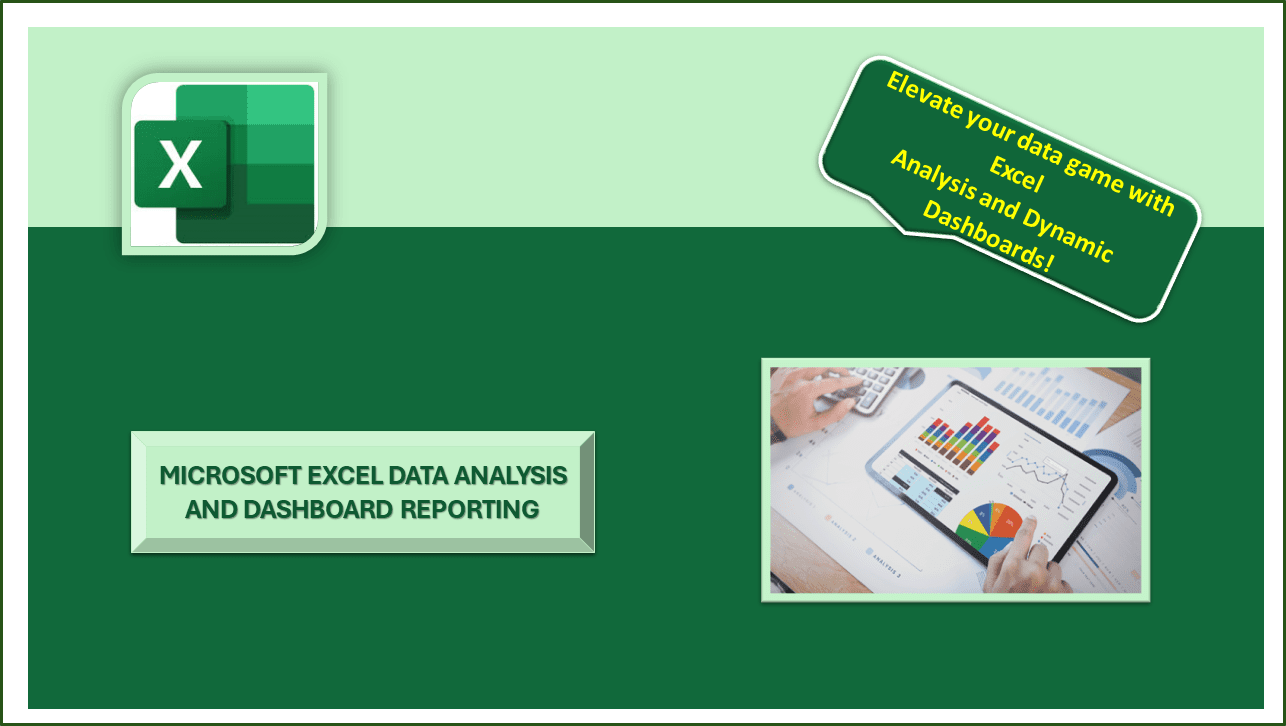
About Course
Course Overview:
In this comprehensive course, you will learn how to harness the power of Microsoft Excel for data analysis and dashboard reporting. From basic data manipulation to advanced analysis techniques, you will discover how to transform raw data into actionable insights and visually appealing dashboards. Whether you’re a beginner or an experienced Excel user, this course will equip you with the skills needed to create dynamic and interactive reports that drive informed decision-making and enhance business performance.
Frequently Asked Questions:
- Can I take this course if I’m new to data analysis?
Absolutely! This course is designed to cater to learners of all levels, including beginners in data analysis. The content is structured to provide a comprehensive introduction to data analysis concepts and techniques using Excel, making it accessible and practical for beginners.
- Do I need any prior experience with Excel to enroll in this course?
While some basic proficiency in Excel is recommended, you don’t need extensive experience to benefit from this course. The course covers essential Excel functions and features used in data analysis, and the instructor provides step-by-step guidance to help you build your skills from the ground up.
- Will I learn how to create interactive dashboards in Excel?
Yes, the course covers advanced techniques for creating dynamic and interactive dashboards in Excel. You’ll learn how to incorporate interactive elements, such as slicers and dropdown lists, to enhance user experience and facilitate data exploration.
- Can I apply the skills learned in this course to my professional projects?
Absolutely! The techniques and methodologies taught in this course are directly applicable to real-world data analysis and reporting projects across various industries. Whether you’re analyzing sales data, tracking financial performance, or monitoring operational metrics, the skills you acquire will be invaluable in driving data-driven decision-making and business success.
- Is there a community or forum where I can interact with other learners?
Yes, we provide access to a dedicated online community where you can connect with fellow learners, ask questions, share insights, and collaborate on projects. It’s a supportive environment where you can learn from others, exchange ideas, and expand your network within the data analysis community.
- How much time should I dedicate to this course each day/week?
We recommend dedicating 3-4 hours each week to watch the video lectures, complete the exercises, and practice applying the concepts in Excel. The more time you invest, the more proficient you’ll become in data analysis and dashboard reporting.
- Can I access the course materials after completing the course?
Yes, once you enroll in the course, you’ll have 1 year access to the course materials, including video lectures, downloadable resources, and practice datasets. You can revisit the content at any time to refresh your knowledge or reinforce your skills.
- Will I receive a certificate upon completion of the course?
Yes, upon successfully completing the course and any associated assessments, you will receive a certificate of completion. This certificate can be a valuable addition to your resume or professional portfolio, showcasing your proficiency in data analysis and dashboard reporting.
- Can I get personalized assistance if I encounter any difficulties during the course?
Absolutely! Our support team is here to assist you with any questions or challenges you may encounter while taking the course. You can reach out to us via email or through the course platform, and we’ll provide prompt assistance to ensure your learning journey is smooth and successful.
- How can I stay updated on new developments and features in Excel’s data analysis tools?
To stay updated on the latest developments and features in Excel’s data analysis tools, we recommend subscribing to industry newsletters, following Excel blogs and forums, and exploring online resources dedicated to data analysis and Excel proficiency. Additionally, joining professional communities and attending workshops or webinars can help you stay informed and connected with the latest trends and advancements in the field.
Course Content
1. Introduction to Data Analysis and Dashboard Reporting
2. Getting Started with Data Manipulation and Transformation in Excel
3. Data Integration and Consolidation for Comprehensive Analysis
4. Advanced Data Analysis Techniques in Excel
5. Creating Interactive Dashboards in Excel
6. Data Visualization Best Practices for Dashboard Design
7. Forecasting and Trend Analysis with Excel
8. Automation and Efficiency Tips for Dashboard Reporting
9. Real-world Applications and Case Studies in Data Analysis
10. Final Project: Building a Comprehensive Dashboard Reporting Solution
Student Ratings & Reviews


